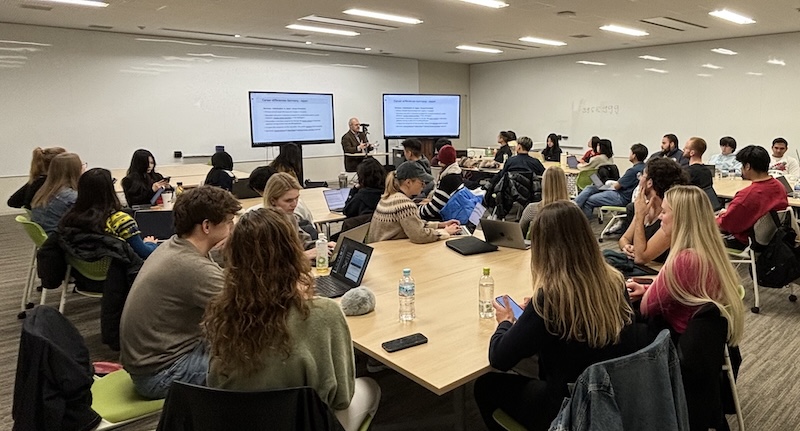NEWS
2025/01/31 教育・研究
Dr. Lorenz Granath discussed relational spaces of education and employment
Student learned from the guest speaker, Dr. Lorenz Granath, about the key differences of the German and Japanese educational system. Germany is basically oriented towards a vocational education, which covers the traditional vocational education to become a baker, a banker or office worker with working and learning in a company and additional vocational school once a week.

Vocational training is however even given in the university, as students must do up to six months internships in companies to get an idea what the later job life will be. Here they learn about the application areas of their studies. According to D. Lorenz the education in Japan is primarily done by companies and universities still function much more as selection organizations. In Germany it is important what you learned, for example engineering is equally good at most of the universities; in contrast in Japan, it is important where you learn because the ranking of the university opens later job opportunities.
--
Chaeyoung found that Dr. Granath faces various challenges navigating between the German achievement-oriented culture and Japanese ascription-oriented norms. Student Jesus evaluated the guest speaker as “a renowned expert in science and industry, with extensive experience fostering cooperation between Germany and Japan”. Prof. Rolf D. Schlunze told students attending the Cross-cultural management research course that his adaptation to the professional business environment and his networking can be seen as crucial aspect of his success.
Yagiz found that Dr. Lorenz Granrath offered an in-depth comparison of the education systems in Germany and Japan, emphasizing how their cultural differences influence academic and professional paths. His lecture offered a comprehensive perspective on how education, culture, and industry intersect to shape career opportunities and the future of work.
Miranda learned that a clear goal strategy in Germany (inner control) conflicts sometimes with blur aims and fexiblity needed in Japan (outer control).
Michael and Line stated that Dr. Granrath discussed the challenges and opportunities by Work 4.0. He emphasized lifelong learning, IT literacy, interdisciplinary thinking, and maintaining a healthy work-life balance important for adaptation to changing workplaces. A German subsidiary of a German organisation has the German expectations, however working in a Japanese organization confronted him with the different attitude there.
--
The students learned from Dr. Granrath, that networking with local entities who have international experience can provide an understanding but not necessarily job opportunities when power positions are rotating. Consequently, the job position of Dr. Granrath is quite specialized. He never got a job by applying through advertisements, but every job opportunity came from his network. Thus, Yagiz concluded that Dr. Granrath shed light on cultural and professional differences, such as Germany’s acceptance of job mobility versus Japan’s emphasis on group loyalty and stability. Students noticed the educational and professional differences but were not critical on the issues of compatibility of both educational systems, although the implications for their own career in Japan are obvious. Nevertheless, Emilio found that Dr. Granrath encouraged students “To get out of your comfort zone and embrace new challenges such as working in a job that is way different from your degree... If you take this path, you will surely face some kind of obstacles. But if you beat them, success is going to be waiting for you”.



